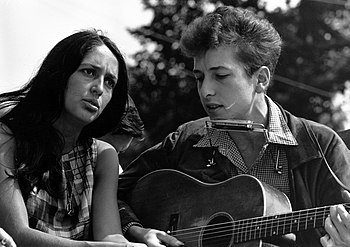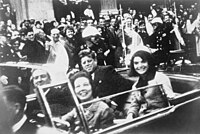The 1960s Portal
The 1960s became synonymous with the new, radical, and subversive events and trends of the period. In Africa the 1960s was a period of radical political change as 32 countries gained independence from their European colonial rulers. Some commentators have seen in this era a classical Jungian nightmare cycle, where a rigid culture, unable to contain the demands for greater individual freedom, broke free of the social constraints of the previous age through extreme deviation from the norm. Christopher Booker charts the rise, success, fall/nightmare and explosion in the London scene of the 1960s. However, this alone does not explain the mass nature of the phenomenon. Several nations such as the U.S., France, Germany and Britain turned to the left in the early and mid 1960s. In the United States, John F. Kennedy, a Keynesian and staunch anti-communist, pushed for social reforms. His assassination in 1963 was a stunning shock. Liberal reforms were finally passed under Lyndon B. Johnson including civil rights for African Americans and healthcare for the elderly and the poor. Despite his large-scale Great Society programs, Johnson was increasingly reviled by the New Left at home and abroad. The heavy-handed American role in the Vietnam War outraged student protestors across the globe, as they found peasant rebellion typified by Ho Chi Minh and Che Guevara more appealing. Italy formed its first left-of-center government in March 1962 with a coalition of Christian Democrats, Social Democrats, and moderate Republicans. Socialists joined the ruling block in December 1963. In Britain, the Labour Party gained power in 1964. In Brazil, João Goulart became president after Jânio Quadros resigned. This is a Featured article, which represents some of the best content on English Wikipedia..
The September 1964 South Vietnamese coup attempt took place before dawn on September 13, 1964, when the ruling military junta of South Vietnam, led by General Nguyễn Khánh, was threatened by a coup attempt headed by Generals Lâm Văn Phát and Dương Văn Đức, who sent dissident units into the capital Saigon. They captured various key points and announced over national radio the overthrow of the incumbent regime. With the help of the Americans, Khánh was able to rally support and the coup collapsed the next morning without any casualties. In the immediate month leading up the coup, Khánh's leadership had become increasingly troubled. He had tried to augment his powers by declaring a state of emergency, but this only provoked large-scale protests and riots calling for an end to military rule, with Buddhist activists at the forefront. Fearful of losing power, Khánh began making concessions to the protesters and promised democracy in the near future. He also removed several military officials closely linked to the discriminatory Catholic rule of the slain former President Ngô Đình Diệm; this response to Buddhist pressure dismayed several Catholic officers, who made a few abortive moves to remove him from power. (Full article...)This is a Good article, an article that meets a core set of high editorial standards.
Madhouse on Castle Street is a British television play, broadcast by BBC Television on the evening of 13 January 1963, as part of the Sunday Night Play strand. It was written by Evan Jones and directed by Philip Saville. The production featured the young American folk music singer Bob Dylan, who soon became a major musical star. The play was made with electronic video cameras, although recorded onto film rather than tape. The only known copy of the play was junked in 1968, as was the standard practice of the time, despite the fact that Dylan and lead actor David Warner were by then famous. Although extensive searches have been made by the BBC, only partial audio recordings of four songs sung by Dylan survive. (Full article...)Selected picture - American folk singers Joan Baez and Bob Dylan, performing a duet at the March on Washington for Jobs and Freedom on August 28, 1963. Both were relatively new recording artists at the time, with Baez being at the forefront of American roots revival and Dylan having just released his second album. Baez was especially influential in introducing audiences to Dylan's music by recording several of his early songs and inviting him onstage during her own concerts.
Did you know -
Related portalsThis is a Featured article, which represents some of the best content on English Wikipedia..
Peter Sellers CBE (born Richard Henry Sellers; 8 September 1925 – 24 July 1980) was an English actor and comedian. He first came to prominence performing in the BBC Radio comedy series The Goon Show. Sellers featured on a number of hit comic songs, and became known to a worldwide audience through his many film roles, among them Chief Inspector Clouseau in The Pink Panther series. Born in Southsea, Sellers made his stage debut at the Kings Theatre, Southsea, when he was two weeks old. He began accompanying his parents in a variety act that toured the provincial theatres. He first worked as a drummer and toured around England as a member of the Entertainments National Service Association (ENSA). He developed his mimicry and improvisational skills during a spell in Ralph Reader's wartime Gang Show entertainment troupe, which toured Britain and the Far East. After the war, Sellers made his radio debut in ShowTime, and eventually became a regular performer on various BBC radio shows. During the early 1950s, Sellers, along with Spike Milligan, Harry Secombe and Michael Bentine, took part in the successful radio series The Goon Show, which ended in 1960. (Full article...)This is a Good article, an article that meets a core set of high editorial standards.
Edson Arantes do Nascimento (Brazilian Portuguese: [ˈɛtsõ aˈɾɐ̃tʃiz du nasiˈmẽtu]; 23 October 1940 – 29 December 2022), better known by his nickname Pelé (Portuguese pronunciation: [peˈlɛ]), was a Brazilian professional footballer who played as a forward. Widely regarded as one of the greatest players of all time, he was among the most successful and popular sports figures of the 20th century. In 1999, he was named Athlete of the Century by the International Olympic Committee and was included in the Time list of the 100 most important people of the 20th century. In 2000, Pelé was voted World Player of the Century by the International Federation of Football History & Statistics (IFFHS) and was one of the two joint winners of the FIFA Player of the Century. His 1,279 goals in 1,363 games, which includes friendlies, is recognised as a Guinness World Record. Pelé began playing for Santos at age 15 and the Brazil national team at 16. During his international career, he won three FIFA World Cups: 1958, 1962 and 1970, the only player to do so and the youngest player to win a World Cup (17). He was nicknamed O Rei (The King) following the 1958 tournament. With 77 goals in 92 games for Brazil, Pelé held the record as the national team's top goalscorer for over fifty years. At club level, he is Santos's all-time top goalscorer with 643 goals in 659 games. In a golden era for Santos, he led the club to the 1962 and 1963 Copa Libertadores, and to the 1962 and 1963 Intercontinental Cup. Credited with connecting the phrase "The Beautiful Game" with football, Pelé's "electrifying play and penchant for spectacular goals" made him a star around the world, and his teams toured internationally to take full advantage of his popularity. During his playing days, Pelé was for a period the best-paid athlete in the world. After retiring in 1977, Pelé was a worldwide ambassador for football and made many acting and commercial ventures. In 2010, he was named the honorary president of the New York Cosmos. (Full article...)Selected article -The 1964 Brazilian coup d'état (Portuguese: Golpe de estado no Brasil em 1964) was the overthrow of Brazilian president João Goulart by a military coup from March 31 to April 1, 1964, ending the Fourth Brazilian Republic (1946–1964) and initiating the Brazilian military dictatorship (1964–1985). The coup took the form of a military rebellion, the declaration of vacancy in the presidency by the National Congress on April 2, the formation of a military junta (the Supreme Command of the Revolution) and the exile of the president on April 4. In his place, Ranieri Mazzilli, the president of the Chamber of Deputies, took over until the election by Congress of general Humberto de Alencar Castelo Branco, one of the main leaders of the coup. Democratically elected vice president in 1960, Jango, as Goulart was known, assumed power after the resignation of president Jânio Quadros, in 1961, and the Legality Campaign, which defeated an attempted military coup to prevent his inauguration. During his government, the economic crisis and social conflicts deepened. Social movements political, labor, peasant, student, and low-ranking military milieus advocated for a set of "base reforms" proposed by the president. He met growing opposition among the elite, the urban middle class, a large portion of the officer corps, the Catholic Church and the press, who accused him of threatening the legal order and of colluding with communism, social chaos and the breakdown of military hierarchy. Throughout his tenure, Goulart had come under numerous efforts to pressure and destabilize his government and plots to overthrow him. Brazil's relations with the United States deteriorated and the American government allied with opposition forces and their efforts, supporting the coup. Goulart lost the support of the center, failed to approve the base reforms in Congress and in the final stage of his government relied on pressure from reformist movements to overcome the resistance of the Legislature, leading to the height of the political crisis in March 1964. (Full article...)More Did you know (auto generated)
TopicsCategoriesWikiProjects
Associated WikimediaThe following Wikimedia Foundation sister projects provide more on this subject:
Discover Wikipedia using portals |



























